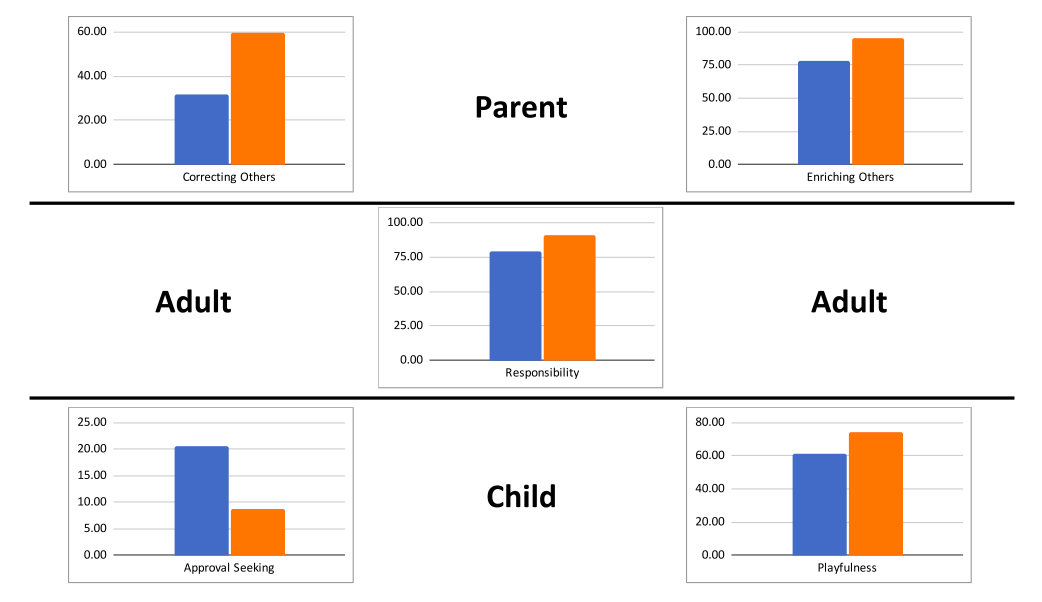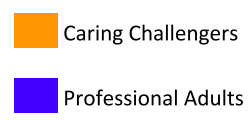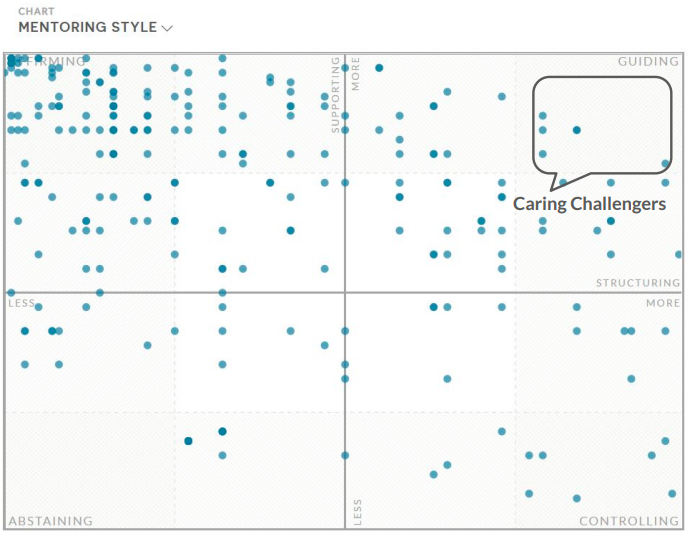One of the things I do at PAIRIN is talk to the people who use our tools to see if I can find answers for their questions in our data. Recently, our Director of Coach Training, Susan Simpson, asked me to explore what our data shows about people who have attributes that are in opposition with one another. For example, people who are high in both Independence and Support Seeking. How do people who want to operate on their own and rely only on themselves balance their drive to also seek support from others? What a unique polarity!
As Susan and I talked more, we decided to focus on people who fit into three groups:
- Independent Support Seekers (High on Independence and Support Seeking)
- Caring Challengers (High on Enriching Others and Correcting Others)
- Organized Change Agents (High on Order and Change)
These groups can be tiny parts of the population, but it’s important for coaches to know what drives these rare individuals. Additionally, looking at these sometimes confusing or diametrically opposed attribute combinations can reveal new ways of thinking about other opposing ideas we may see when coaching others.
One of the first things I defined was what “high” meant for this research. After working with the data, I settled on using a metric that could be applied across all six attributes: the top 25 percent for each attribute. So, to be included, a person would need both attributes in the top 25th percentile.
I analyzed these three groups against a population of 3,828 professional adults. Each group is shown below with the number of people included in the analysis:
- Independent Support Seekers: 199 individuals (5% of the population)
- Caring Challengers: 36 individuals (1% of the population)
- Organized Change Agents: 613 individuals (16% of the population)
Independent Support Seekers
Independent Support Seekers have the drive to act with self-determination without concern for the opinions, expectations or influence of others, and also feel an inherent need to be helped, comforted, sustained or advised by a close friend or protector. Looking at the attribute levels for this group of people in comparison to other professional working adults reveals some wonderful insights that can help a coach navigate these potentially challenging score combinations. They may need extra coaching attention with Problem Solving, Courage, Decision-Making, Grit and Dynamism. They tend to score lower on all these attributes than other professional adults. Interestingly, their Self-Confidence is also lower than others, but not to the same degree as the other attributes. There could be benefits to shoring up their self-efficacy. There’s enough of a relationship in those lower attributes that their support seeking behavior may be more a lack of confidence in their own problem-solving, energy and persistence. It appears that while they have a great desire to be independent, they may suffer inner conflict due to low self-confidence about their abilities.
Caring Challengers
Caring Challengers are skilled at nurturing those around them while being unafraid to challenge shortcomings that need to be improved. They seem to embrace the PAIRIN value of Valuing the Whole Person, and specifically, accepting people where they are and caring too much about them to let them stay there. You can learn a lot about them by looking at their Relating Styles attributes compared to other professional adults.


The above graphic shows how a person’s ways of relating to others are reflected in PAIRIN attributes. These people are high in both aspects of the Parent and the Adult role, leading to mature, caring decisions. But they also bring in the Playfulness — without the Approval Seeking behavior of the child. Looking more at the attributes of Caring Challengers, we see that these assertive, persistent, gritty, optimistic leaders are deeply connected with people around them and personally dedicated to caring about them. Meanwhile, on the low end of the spectrum as compared to other professionals, they 1) don’t tend to seek support or approval from others, 2) are less likely to self-blame and, 3) are less self-restrained. They’re confident in their own abilities and critique while caring deeply and being willing to go the extra mile for those around them.

Caring Challengers appear in the upper right, or “Guiding”, quadrant of the Mentoring Style chart in PAIRIN’s professional console (see above). The chart itself is intended to give an at-a-glance overview of how individuals seek to guide and encourage others toward their greatest potential. It plots the Correcting Others versus Enriching Others attribute combination and supplies content that corresponds to nine possible scoring areas. Caring Challengers bring both high support and high structure when developing others, which results in a Guiding style of mentoring or managing. While self-assured and assertive people often respond well to direct and caring feedback, other individuals may need a softer, more cheer-leader-type approach. Which is the best combination? Like with almost all of the PAIRIN attributes—it depends. Many of the most versatile, masterful coaches score high in Enriching Others and no higher than moderate in Correcting Others. They are like the chefs who add just the right amount of salt to a dish to bring out and enhance the flavor.
Organized Change Agents
Organized Change Agents are high on the Order driver and also high on the Change driver. This is unexpected because those who are high on Change are generally driven to transform processes or the environment around them, whereas people high on Order are more likely to want to maintain the status quo through organization and structure. One driver wants to break structure and the other seeks to maintain it. Further studying this group of people, we find they also have both feet planted solidly in two high thinking styles: Objective-Analytical and Intuitive-Conceptual. So, the Organized Change Agents are able to actively switch between and enjoy using two thinking styles which might also be thought to conflict with/complement one another. They can think very critically about how a problem might be analyzed using available data but also think about the same problem in a purely conceptual, “by the gut” way. This group is also characterized by more Individuality, Independence and Critical Thinking. They are like new-knowledge-sponges as they also score high in both Love of Learning and Curiosity. They’re motivated, energetic, productive, problem solvers. Much like the Caring Challengers, they’re slow to restrain or blame themselves and are very low on Deference. They’re unlikely to be shy wallflowers who wait for things to happen, and instead, they methodically work to make change happen.
One common factor among all three groups is their extreme scores in Emotional Intelligence (EI). Independent Support Seekers generally have lower EI by 14 to 25 percentile points than everyone else. In contrast, both the Caring Challengers and the Organized Change Agents are higher in EI by 5 to 15 points than the rest of the population. Being high in EI means that they’re more in touch with their own emotions as well as those of others. So, this is pretty telling for these groups. The Independent Support Seekers may feel an internal conflict between their desire to act independently and the strength of their more basic self-construct skills. As a result, they are more likely to seek out the support and approval of others. Likewise, the Caring Challengers and the Organized Change Agents are very self-confident — even in their ability to understand and interact with others. This makes it possible for them to seamlessly shift between what may seem to be conflicting behaviors.
Application to Your Organization
So, while these people may appear in your organization more rarely, you might want to use The PAIRIN Survey to search for and better understand them. For instance, if you have a particularly challenging change coming, you might want to look for an Organized Change Agent in your midst and bring them on board the team. Additionally, you may want to supercharge your organization’s coaching by looking for a person who is moderate to high in Correcting Others and help them develop in Enriching Others (or the other way around) to position them as a Caring Challenger. And, if you see an Independent Support Seeker in your organization, you can help them develop their Self-Confidence and Decision Making to bring down their Support Seeking and let their Independence and Creativity blossom in your organization.
